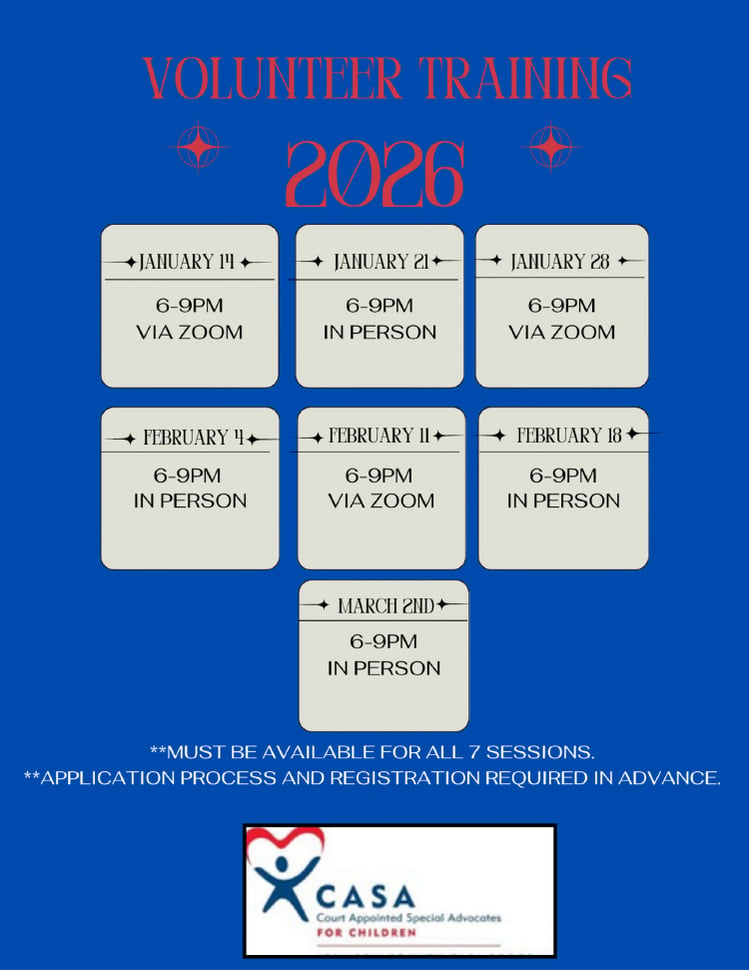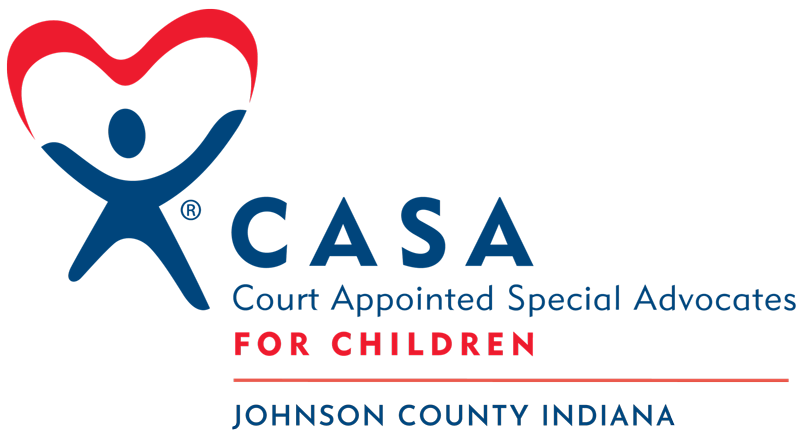Become an Advocate
Court Appointed Special Advocates speak up for abused and neglected children.
Our volunteers, who come from all walks of life, are specially trained volunteers who are appointed by the Court to advocate for the best interest of children and youth who have experienced abuse and/or neglect.
They work with child welfare professionals, attorneys, educators and service providers to ensure that judicial officers have all the information they need to make decisions for each child.
Our Advocates are a reliable influence in the life of a child whose whole world has been turned upside down due to abuse and/or neglect. They give children hope by giving them a voice.
Job Description
Johnson County CASA Volunteer
CASA volunteers are appointed by Family Court Judges to promote the best interests of abused and neglected children involved in Family Court proceedings. The CASA volunteer must research the facts of the case, provide written and/or oral reports to assist the court in identifying concerns, facilitate the resolution of the presenting problems, and monitor progress toward established goals.
- Volunteers must be 21 years of age with a high school diploma or equivalent.
- Interest in children, their rights and special needs.
- Time to devote to training sessions, research and follow-up of an assigned case (two-year minimum commitment. The hours needed vary by case, but most CASA volunteers find 5-10 hours monthly is sufficient.
- Ability to respect and relate to people from various backgrounds in a variety of settings tact, compassion and human relation skills.
- Excellent verbal and written communication skills - making verbal and written reports to the court, to the CASA staff and to other persons as needed.
- Ability to gather and record factual information accurately.
- Ability to be approved following a background investigation.
- Ability to provide at least three references from sources other than relatives.
- Complete National CASA training curriculum (approximately 30 hours in length) followed by court observations.
- Be sworn in by an Officer of the Court.
- Maintain strict confidentiality according to the sworn oath.
- Attend a minimum of 12 hours of in-service training sessions annually.
- Complete an intensive independent review of each case.
- Keep CASA staff regularly informed of all case-related activities.
- Maintain an up-to-date, detailed and complete file on each case assigned, including dates of court appearances and visits with the child(ren).
- Remain actively involved in the case until released by the Court, or until the case assignment is complete.
- Keep the CASA file in a secure location to maintain confidentiality.
- Be aware of deadlines, Court appearances and timetables involving an assigned case; turn in all reports in a timely manner.
- Complete information requested by staff that may be required for the CASA program.
- Return the case file including all the written and electronic documents to CASA staff upon completion of the case. All electronic files must be deleted from the volunteer’s computer.
- Participate in an annual review regarding CASA program with the director.
Research - Complete an intensive, independent review of each case through personal interviews and review of all pertinent records, documents and reports.
a. Upon assignment to a case, interview the child(ren), family members, foster family, teachers, doctors, therapists, social service workers and other interested parties to gather facts.
b. Research potential alternatives available for the child including relatives, foster placement, etc.
c. Work with relevant parties to ensure that a permanency plan for the child is developed and implemented in a timely manner.
d) Visit with the child(ren) on a monthly basis at minimum.
Review - Ensure that all relevant facts known to CASA are before the Court through written or verbal reports.
a. Prepare a written report stating facts and concerns and submit the report to CASA staff 7-10 days prior to the Court appearances.
b. All CASA reports must be reviewed by the CASA director prior to submission to the Court.
c. Appear in Court as needed for proceedings and hearings if possible.
Facilitate - Coordinate the flow of information among the parties to fulfill their obligations to the child(ren) and family in a timely manner.
a. Assist in the development and implantation of any plan ordered by the court, including permanency plans.
b. Provide information to assist the Court in determining whether appropriate services, including reasonable efforts, are being provided in a timely manner.
4. Monitor - Compliance with court-ordered services through continued contact with the child(ren), family and all relevant parties.
Take Your First Step
If you are interested in becoming a volunteer, we invite you to contact us for an online application link. This and additional interviews help both of us to determine if you have the skills to serve the best interests of the abused and neglected children in our community.
CONTACT US
Volunteer Training Schedule
Next Class

Frequently Asked Questions
About Being an Advocate
A Court Appointed Special Advocate (CASA) volunteer is a trained community member who is appointed by a judge to represent the best interests of abused and neglected children in court.
An attorney is charged with representing their client's legal interests and with following the wishes of their client. CASA is appointed as the child's Guardian ad Litem (GAL) and is responsible for making recommendations about what things would be best for the child. The CASA volunteer will write and file reports with the court. The CASA volunteer provides crucial background information that assists the court in decision making.
Children who are victims of abuse and neglect who have become wards of the court are assigned CASA volunteers. A CASA may be requested by any party in the case. A Judge will assign CASA to the case. Children are wards of the Court and involved with the Department of Child Services (DCS). The Courts also have the discretion of appointing CASA to any case where the best interest of children is being litigated.
CASA volunteer's complete a total of 30 hours pre-service training which consists of 16 hours of class time, and 14 hours of homework and independent study. Preliminary training covers a wide range of topics such as cultural diversity, working with children and families, interviewing, writing court reports and much more. After training is completed, a new volunteer will be assigned a mentor for their first case. Additionally, CASA volunteers are required annually to have 12 hours of continuing education training.
After their initial training, a CASA volunteer usually spends 8-10 hours per month but this can vary. CASA volunteers commit to stay on a case until it is resolved, typically about 12-18 months.
The volunteer continues until the case is permanently resolved. One of the primary benefits of the CASA program is that, unlike other court principals who often rotate through cases, the CASA is a consistent figure in the proceedings and provides continuity for a child. Typical cases last 12 - 18 months.
CASAs come from all walks of life and possess a variety of professional, educational and ethnic backgrounds. There are more than 70,000 CASAs nationally. Local programs vary in number of volunteers they utilize. Aside from their CASA work, 64 percent are employed in full- or part-time jobs; the majority tend to be professionals with 58% being college or university graduates. The majority (82%) of the advocates nationwide are women. CASA programs have a huge need for more men to volunteer. Many of the kids in care are young boys who desperately need a male role model.
Prospective volunteers must be at least 21 years of age, and undergo criminal and Child Protective Services background checks. Applicants are required to complete a volunteer application and a 30 hour training class (16 hr. class and 14 hr. independent study). Volunteers should have effective oral and written communication skills.
A CASA volunteer provides a judge with carefully researched background of the child to help the court make a sound decision about that child's future. The CASA volunteer must determine if it is in a child's best interest to return to his or her parents or guardians, be placed in foster care, be placed with other relatives, or be freed for permanent adoption.
There are many professionals who are involved in the lives of victimized children. Unfortunately, their role is sometimes limited by time constraints. An overburdened DCS system makes frequent visits difficult. DCS workers are required to see their clients once every four tweeks. By law, they must advocate on behalf of the parents' rights as well as the child's and endeavor to reunify the family.
CASA volunteers offer the child trust and advocacy during complex legal proceedings. With the sometimes frequent changes in people and placement, the CASA may be the only constant in the child's life. CASA volunteers encourage the child to express his or her own opinions, while remaining objective.
To prepare a recommendation, the CASA volunteer talks with the child, parents, family members, social workers, school officials, health providers and others who are knowledgeable about the child's history. The CASA volunteer also reviews all records pertaining to the child -- school, medical and caseworker reports; and other documents.
Typically each CASA carries one case at a time, allowing them to focus on the particular needs of one child or sibling group.
The Child's Voice in Court®
Johnson County CASA is part of a national volunteer movement that began when a judge in Seattle started was using community volunteers as a "voice in court" for abused and neglected children. There are more than 900 CASA programs in operation - at least one in every state - and more than 52,000 trained volunteer advocates nationwide.
LEARN ABOUT CASA

